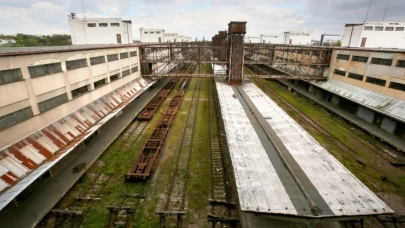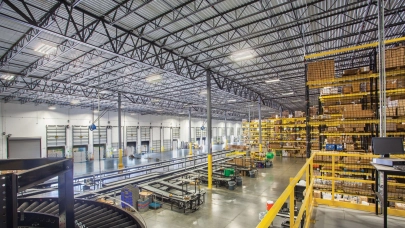
The highest ever 5.2 million sqm of warehouse space was leased in 2020 as a result of significant changes in consumer behaviour in this exceptional year. The industrial and logistics sector was the fastest to adapt to the new requirements linked with the COVID-19 pandemic, quickly adopting supply chains and ensuring health and safety to workers and customers. 2020 was also the year of rapid growth of all segments related to the e-commerce sector. In the coming years, e-commerce will set the pace of development for the entire warehouse market in Poland. AXI IMMO presents their report Polish Industrial & Logistics Market in 2020.
Investment: Warehouses take half of the market
In the last quarter of 2020, the value of warehouse investment transactions reached approximately €700m, thus taking the annual total to a record high €2.6bn, which is 65% higher than in 2019 and 41% higher compared to the previous record set in 2018 (€1.8 bn). This result is particularly impressive as it represents around 50% of the capital invested in the entire Polish commercial real estate market and was achieved despite significant difficulties with site visits. Increased interest in the warehouse sector has driven down yields, which currently stand at 6-6.25% (gross) for big-box facilities, 5.5%-6% for city logistics projects and 4.25-4.5% for single-tenant properties with long leases and high-quality occupiers.
Among the most interesting transactions recorded in 2020 was the acquisition of Goodman’s Central European portfolio by Singapore stock exchange-listed GLP (approx. 880,000 sqm, 66% of the facilities are located in Poland), the sale of Panattoni’s portfolio of 5 warehouse properties of approx. 280,000 sqm to Savills IM, the acquisition of 7 buildings within P3 Park Mszczonów from P3 by Elite Partners Capital (approx. 229,000 sqm), and the purchase of Hines’ nationwide portfolio (170,000 sqm) by CGL. New players also appeared on the Polish investment market. One such transaction is the purchase of the Logistic City park in Central Poland (135,000 sqm) by REINO Capital, Grosvenor and IO AM.
„Quite unexpectedly, the COVID-19 pandemic proved to be a key driver of the industrial sector in Poland, with a significant positive impact on investor sentiment. The impressive, record-breaking result of €2.6bn is mainly due to large portfolio transactions in which, as in previous years, Asian players were the main buyers. BTS facilities and prime multi-let schemes with a quality occupier mix and long leases remain the most desirable assets in the market,” says Renata Osiecka, Managing Partner, AXI IMMO.
5.2 million sqm leased in 2020 thanks to e-commerce and logistics
Total take-up in the industrial sector in 2020 reached a record 5.2m sqm (+29% y-o-y). The fourth quarter accounted for 1.5m sqm, which is in turn the best quarterly result in history. Moreover, 594k sqm of industrial space was leased during 2020 on a short term basis – a 95% increase compared to the previous year. The TOP 5 leasing transactions in 2020 in the industrial market included Amazon Świebodzin (203,500 sqm), Prologis Janki – Euronet (73,400 sqm), Hillwood Łódź I (Górna) – Amazon BTS (73,000 sqm), 7R BTS Żabka – Radzymin (67,500 sqm) and Panattoni – BTS 4F Czeladź (67,000 sqm). The occupier break-down reveals ongoing dominance of logistics and distribution firms (36.1%) before retailers (24.2%) and the fast-growing e-commerce sector (15.5%). Production companies accounted for 8.4% of A-class space leased in 2020.
„We can say with certainty that throughout 2020, the e-commerce industry was the main force driving changes in the industrial market. The growing popularity of online sales had a positive knock-on effect on activity in other sectors, especially on courier companies and the packaging industry. The second group of companies that recorded significant growth were those producing and distributing durable consumer goods such as electronics, furniture, home furnishings and sports equipment. Another fast-growing segment was the e-mobility industry, especially within the production of batteries for electric cars,” says Anna Głowacz, Head of Industrial, AXI IMMO.
A more cautious policy of developers in launching new schemes
Poland’s total industrial stock reached 20.5m sqm (+11% y-o-y) at the end of 2020. Throughout the year, developers delivered 2.1m sqm (-23.5% y-o-y), with the most active players being Panattoni (nearly one million sqm), Hillwood (322,200 sqm) and 7R (165,400 sqm). The largest projects delivered in 2020 include Panattoni A2 Warsaw Park (Grodzisk) – 103,700 sqm, P3 Mszczonów – 75,800 sqm, Hillwood Wrocław Wschód II – 63,900 sqm, MLP Pruszków II – 55,000 sqm, Prologis Ruda Śląska – 51,200 sqm and 7R Park Gdańsk II – 50,900 sqm. At the end of 2020, there was 1.9m sqm of modern warehouse space under construction (-2% y-o-y). The share of speculative development fell to 23.6%, reaching its lowest level since Q3 2017. Most new supply under construction is in Upper Silesia – 359,000 sqm, Warsaw – 357,000 sqm and the Tricity – 272,000 sqm.
„Throughout 2020, we have seen a marked slowdown in development activity mainly due to tighter bank financing conditions for new development projects, including higher deposit and pre-let ratio requirements. Nevertheless, a noticeable upturn in new supply at the end of the year allows us to look into 2021 with optimism,” says Anna Głowacz.
As a result of high absorption in the warehouse market, the vacancy rate fell back to 7.1% (-40 bps y-o-y) at the end of 2020. The highest vacancy rates were recorded in Upper Silesia (10.2%) and Warsaw’s Zone II (10.1%). In contrast, Szczecin and Eastern Poland have the smallest amounts of available space in percentage terms (below 1%), followed by Warsaw’s Zone III (1.4%), Western Poland (2.4%) and Tricity (3.4%).
The rental pricing policies of most landlords remained unchanged at the end of 2020. The pandemic situation has not significantly affected headline or effective rents in the industrial and logistics sector, which both held firm throughout 2020. Traditionally, the highest rates were recorded in the Warsaw City zone at 4.80 – 5.25 €/sqm and the lowest in Central Poland, Poznań and selected locations around Warsaw where space could be leased at headline rates as low as 3.0 to 3.2 €/sqm, with the average for most markets ranging between 3.20 and 3.60 €/sqm.
Optimistic outlook
In 2021, we can expect a gradual increase in development activity in response to continued strong occupier demand. Developers should still take a slightly more cautious approach to speculative projects due to the uncertain outlook for the economy. However, the sector has proven that it is based on strong foundations and performs well during the pandemic. As a result, banks have started to ease their lending requirements for new developments in recent months. Going forward, developers, investors and financial institutions are likely to have a strong preference for mature markets with an established track record and high liquidity, guaranteeing a secure income stream and exit opportunities.
“In 2020, the industrial market proved that, despite the COVID-19 pandemic, it has strong foundations and is able to adapt to change quickly. We expect the market to continue to grow robustly in 2021. The key driver will be the ongoing rise of e-commerce, which will generate demand from retailers and logistics companies for urban warehouses. In addition, Poland is expected to continue to attract investment into international e-commerce mega hubs thanks to its strategic location and attractive business costs. Moreover, de-globalisation of supply chains and nearshoring should bring opportunities for the domestic warehouse market. Finally, Brexit is starting to generate demand, with many British companies forced to open distribution centres within the EU borders,” says Renata Osiecka.



